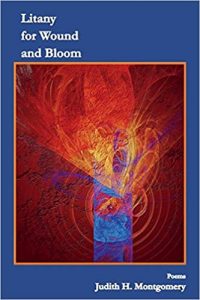 Review by Julie L. Moore
Review by Julie L. Moore
Litany for Wound and Bloom, the fourth collection of poems by Oregon Book Award winner Judith H. Montgomery, is like “Another Kind of Prayer” (one of her poem’s titles), as it both raises excruciating questions—“If in the beginning was the Word then what / of ending— stutter? then silence?”—as well as expresses women’s pain and praise in exquisite language (45). As a follow-up to her previously acclaimed work, Litany for Wound and Bloom incisively explores themes related to infertility and motherhood, oppression women face, and old age, all with painstaking precision.
Organized into three sections, the first is aptly titled, “(Womb),” which poignantly reveals the speaker’s agony with infertility as well as her insightful contemplations about pregnancy. For instance, “D & C” concerns the painful paradox that sometimes accompanies fertility: “To bloom, she understands, / first she must be wounded” (5). Because the speakers in these poems often are “caught / between bloom and prune” (“Cicatricula” 6), it is fitting that “Yet Praise the Scar,” asks us to “[c]onsider how, breached by blade / or flame, the body rushes to repair, / quick-clot the hurt” (12). Montgomery is never satisfied with mere cleverness or astute conceit; she also mines metaphysical meaning in poems such as “Expectant: II,” which reinterprets John 1:1 in the striking voice of the Mother Mary:
I am what I am become—
the word made flesh,
preparing to spill forth.
Unfurling each rib, I enter
hallow, from hollow . . . . (13)
Such poems demonstrate Montgomery’s originality with lineation and lyrical language that travel the often inhospitable topography of womanhood.
In addition, Montgomery understands how to transition well between sections. The last line of “B-Word,” also the last poem in section one, declares, “All words uncoil to bloom in the womb of the poem” (18), leading us seamlessly into “(Word),” the second section. This opens with another discursive poem—“Having Vanished”—about John 1:1. After the annunciation, when “[e]ach molecule of air shines” and “a skirt of shimmer / flicks off dust-dried walls,” Mary realizes “[h]er womb, / no longer hers” presents an “ambiguous gift: crossed / in cords of thorn” (23). Simply put, the masterful assonance and consonance in this poem—“shines” and “shimmer”; “skirt,” “flicks,” and “gift”; and “crossed,” “cords,” and “thorn”—epitomize the strength of Montgomery’s musicality and her impressive originality.
Likewise, Montgomery is masterful as she depicts other women—both in myth and in reality—bound by comparable thorny vines. Thus, by the time we readers encounter “Breast: Still,” one of several moving ekphrastic poems, we then poignantly experience with the survivor of a mastectomy how beauty can mysteriously flourish amid its own loss:
A sharp needle’s mended loss
across her rib—still
she summons us to see
beyond absent beauty
to bloom of lip,
to pulse of nectar at her throat—
to all that speaks, and lives. (44)
Finally, Montgomery shifts her focus in the final section to “(Witness).” Here, we find “Follow-Through,” where the speaker’s babies, now school age, scare her since it’s possible they “rehearse for days” to throw grenades “into some other sons’ makeshift shed / or trench” (53-54). “Simmer” then ruminates on actual wars, as the speaker realizes “how fear deforms object. Subject. How it / twists the blessing of stout wire tight about / the most delicate of human parts” (62). This stunning reversal—blessing yielding torture—gets extended in the poem “A Blessing,” when it explores how paradox can wind so tightly around a relationship, it snaps. In this poem—one of the most harrowing and brave in the collection—we learn
Her job
is to sever. Us from our son.
Our son from home. To assign
custody, the legal keeping
of this child, over to the State. (57)
Because of Montgomery’s earlier poems depicting the travails of infertility, we now endure, in agonizing ways, how the promise of fertility turns against itself. Indeed, the poet is witness, and a helpless one at that, like the voice in “Send,” the book’s last poem that shows South Korean children on a ferry snapping pictures of each other on their cell phones as they drown. These last words emphasize such powerlessness:
I cannot send to erase this boy’s nape, efface
the dim wrist
of that girl, each image a litany
of witness: here am I. Remember me. Us. (71)
What a gorgeous and gut-wrenching book Montgomery has composed. Indeed, it is a litany of wound and bloom, stutter and silence, magnificent in its paradoxical execution.
Litany for Wound and Bloom by Judith H. Montgomery
Uttered Chaos, 2018, 79 pages, $19.00, ISBN 9780999833414
Julie L. Moore is the author of four poetry collections: Full Worm Moon, Particular Scandals, Slipping Out of Bloom, and Election Day. A Best of the Net and Pushcart Nominee, she has also had poetry and reviews appear in Alaska Quarterly Review, Image, New Ohio Review, Poetry Daily, Prairie Schooner, Rattle, Relief, The Southern Review, and Verse Daily. You can learn more about her work at julielmoore.com.
